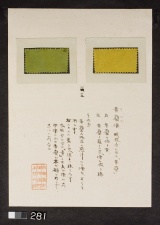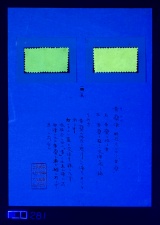Difference between revisions of "Kihada (Amur cork tree) - right (281 R)"
Jump to navigation
Jump to search
(username removed) |
|||
| Line 22: | Line 22: | ||
! scope="row"|Dyestuff (Japanese common name) | ! scope="row"|Dyestuff (Japanese common name) | ||
| 黄蘖 :Kihada | | 黄蘖 :Kihada | ||
| + | |- | ||
| + | ! scope="row"|Dyestuff (English common name) | ||
| + | | Amur cork tree | ||
|- | |- | ||
! scope="row"|Dyestuff (botanical name) | ! scope="row"|Dyestuff (botanical name) | ||
Revision as of 13:25, 23 June 2020
| Museum number | 281 |
|---|---|
| Uemura number / title | ; "Haze-some 25" |
| Folder location | 4th shelf |
| Sample location | right (281 R) |
| Fiber type | silk |
| Color | yellow |
| Dyestuff (Japanese common name) | 黄蘖 :Kihada |
| Dyestuff (English common name) | Amur cork tree |
| Dyestuff (botanical name) | Phellodendron amurense Rupr. var. amurense |
| Plant part | inner bark / dried (?) |
| Dyestuff extraction | boiled in water |
| Auxiliary agent in dye bath | - |
| Mordant | - |
| Other auxiliary agent | - |
| Uemura's notes | This dyeing is what was called "Kihada ()" in the Buyakuryo (), the 8th century AD, Japan. The yellow recorded in the Ebukuryo () from the 8th century AD, Japan could have been achieved by dyeing with Kuchinashi (Gardenia jasminoides Ellis var. jasminoides), Kariyasu (Miscanthus tinctorius (Steud.) Hack.) , or Kihada, but is thought to have been achieved with Kariyasu. |
| Uemura's date | Kyoto Murasakino |

